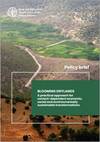This video presents a way of thinking about the issue of cross-border transhumance by mobilizing a reflection on the future: territorial foresight. The method was implemented during a participative case study conducted by FAO and partners (CIRAD, ISRA, and local organizations) in Burkina Faso and Togo in 2019-2020, with the purpose of enabling local actors to imagine different futures for their territory and to understand how and why these futures may occur. Two main questions were raised: what could be the future of the border territory between Togo and Burkina Faso in 2035? What could then be the roles and functions of pastoralism in these futures? Participants identify and prioritize the driving forces and build scenarios.
Year of publication: 2021Organization: Food and Agriculture Organization of the United Nations (FAO), Individual authors
Topic: Innovation, Resilience
Language: English
Type of document: Videos
Geographical coverage: West Africa
The flyer shows 12 good practices, which can contribute to increased milk quantity and quality.
Year of publication: 2021Organization: Food and Agriculture Organization of the United Nations (FAO)
Topic: Food security
Language: English
Type of document: Newletters
Geographical coverage: Central Asia
The VGGT Popular Version for Communal Land Administration was developed to support the Parliament of Namibia in delivering training to traditional authorities and regional institutions to enhance their capacity to administer communal land within their jurisdictions. This was carried out in line with the Communal Land Reform Act, Act 5 of 2002 and the resolutions of the 2nd National Land Conference. The Popular Version outlines 14 pertinent land governance issues in Namibia’s communal areas. These issues which were validated by the MAWLR are discussed briefly and followed by identifying key messages of the VGGT that are relevant within the context of communal land administration in Namibia.
Year of publication: 2021Organization: Food and Agriculture Organization of the United Nations (FAO), Individual authors
Topic: Innovation, Land
Language: English
Type of document: Technical
Geographical coverage: Southern Africa
This brochure presents the main features and application of TAPE, the Tool for Agroecology Performance Evaluation. A participatory tool to assess the multidimensional performance of agroecology for a transition towards sustainable agricultural and food systems
Year of publication: 2021Organization: Food and Agriculture Organization of the United Nations (FAO)
Topic: Innovation
Language: English
Type of document: Policies and legislation
Geographical coverage: Global
With climate change impacts already felt in the world’s drylands, there is an urgent need for action, at various scales and initiated by different stakeholders, to ensure the sustainability of food production and livelihoods in these regions in the coming decades. There is also the need to rapidly establish baselines, assess and start monitoring progress on sustainability, emerging as result of the action taken. To aid in this effort, the Building climate-resilient dryland forests and agrosilvopastoral production systems will provide a short list of expected transformations (under each of the three sustainability pillars) for guiding the planning and implementation of policy, governance and practice-level actions. The paper will also present case studies portraying actions that led to progress in sustainability and directly related to the expected transformations.
Year of publication: 2021Organization: Food and Agriculture Organization of the United Nations (FAO)
Topic: Food security, Resilience
Language: English
Type of document: Technical
Geographical coverage: Global
This policy brief is intended to inform decision-makers of nine transformational actions to sustain dryland production systems under the impact of climate change. It highlights the relevance of the local context for interventions and the importance of traditional and tested adaptive agrosilvopastoral strategies for building resilience. In addition, it emphasizes the potential for scaling up and using complementary technologies over wider areas. In particular, the roles of both women and men should not be neglected in terms of maintaining, creating and restoring dryland sustainable landscapes.
Year of publication: 2021Organization: Food and Agriculture Organization of the United Nations (FAO)
Topic: Food security, Resilience
Language: English
Type of document: Policies and legislation
Geographical coverage: Global
On top of a decade of exacerbated disaster loss, exceptional global heat, retreating ice and rising sea levels, humanity and our food security face a range of new and unprecedented hazards, such as megafires, extreme weather events, desert locust swarms of magnitudes previously unseen, and the COVID-19 pandemic. Agriculture underpins the livelihoods of over 2.5 billion people – most of them in low-income developing countries – and remains a key driver of development. At no other point in history has agriculture been faced with such an array of familiar and unfamiliar risks, interacting in a hyperconnected world and a precipitously changing landscape. And agriculture continues to absorb a disproportionate share of the damage and loss wrought by disasters. Their growing frequency and intensity, along with the systemic nature of risk, are upending people’s lives, devastating livelihoods, and jeopardizing our entire food system. This report makes a powerful case for investing in resilience and disaster risk reduction – especially data gathering and analysis for evidence informed action – to ensure agriculture’s crucial role in achieving the future we want.
Year of publication: 2021Organization: Food and Agriculture Organization of the United Nations (FAO)
Topic: Food security, Resilience
Language: English
Type of document: Technical
Geographical coverage: Global
This evaluation assesses the extent to which FAO adopted an effective, coherent and transformative approach to its work on climate action from 2015 to 2020, by contributing to the achievement of SDG 13 targets and the Paris Agreement. The methodology included portfolio analysis, quantitative content analysis of over 500 documents, participatory stakeholder workshops, desk reviews, interviews with 488 stakeholders, analysis of key FAO products, 3 global surveys, and 13 country case studies.
Year of publication: 2021Organization: Food and Agriculture Organization of the United Nations (FAO)
Topic: Climate change
Language: English
Type of document: Technical
Geographical coverage: Global









